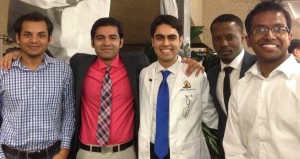Transitioning to my medical school clerkship after my Ph.D. training was stressful. After a five-year absence from the clinic, my medical knowledge and clinical skills were rusty. My practical knowledge — for example, how to find information in medical charts or how to present patients in morning rounds — also needed improvement.
But beyond lacking in experience, there was the added stress of not knowing anyone in my new class. Luckily, from the very first day, my new classmates were incredible, friendly and helpful resources for helping me navigate my way back into the clinic.
 One of these students is Sydur Rahman (class of 2017). Originally from Bangladesh, Sydur grew up in the housing projects of Bed-Stuy in Brooklyn, New York. This was a dangerous place to live. Gunshots outside the window and crack vials on the street were commonplace. A neighbor in his building was shot to death. Many residents also lacked basic health insurance. Even with all these concerns, Sydur’s parents reminded him to keep things in perspective by sharing stories of where they came from, “an area of Bangladesh with poorer health care than Bed-Stuy.”
One of these students is Sydur Rahman (class of 2017). Originally from Bangladesh, Sydur grew up in the housing projects of Bed-Stuy in Brooklyn, New York. This was a dangerous place to live. Gunshots outside the window and crack vials on the street were commonplace. A neighbor in his building was shot to death. Many residents also lacked basic health insurance. Even with all these concerns, Sydur’s parents reminded him to keep things in perspective by sharing stories of where they came from, “an area of Bangladesh with poorer health care than Bed-Stuy.”
Far from discouraging him, the early experiences of living in a tough neighborhood gave Sydur a desire to help the underserved and led him to pursue a career in medicine. Sydur was also fortunate to have a social support system that encouraged his education. His parents placed great value on education and supported him financially, even though money was tight in the family.
During his undergraduate studies at New York University, Sydur volunteered at Bellevue Hospital. “Before I began, I thought I could do little more than collect data and observe traumas in the ER. However, I had the chance to translate for a Bengali woman once. By the end of the exchange, I knew I had enabled communication between a patient and her physician — I had forged a relationship between two human beings.”
After college Sydur worked as an MCAT instructor for a year before entering medical school at Johns Hopkins. While here, Sydur has been involved with Physicians for Human Rights and has especially focused on raising awareness of human trafficking. According to Sydur: “As an aspiring doctor, I seek to build relationships — even transient ones — with patients, while bettering the quality of their lives and continually learning abut the human and natural worlds from them.”